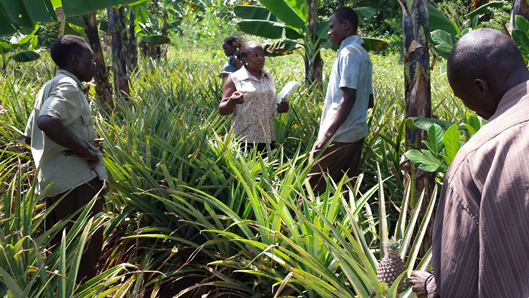08.07.2021 - Power imbalances challenge the objectivity of sustainability research: Contribution to German Sustainability Science Summit
Research methods often reproduce value systems of the scientists. They may thus perpetuate power imbalances that prevent productive knowledge generation. A session organised by ZEU members at the German Sustainability Science Summit 2021 thus called for a more reflected and multidisciplinary academic education in methods.

Photo: Fieldwork among farmers in Uganda (photo by Harriet Kyomugisha)
“Science and researchers aren’t neutral, and science is not superior to other ways of knowledge”, said ZEU member Dr Stéphanie Domptail. “We should thus revise our methods through the eyes and context of the people we study”. Together with Prof. Dr. Martin Petrick, principal investigator of the ZEU-based exceed-center SDGnexus Network, she co-organised a session on “power relations and the transformative role of participation in sustainability science and governance”, held on the 8 July 2021 during the virtual German Sustainability Science Summit 2021. Dr. Torsten Grothmann of Carl von Ossietzky University of Oldenburg and Prof. Dr. Tobias Krueger of Humboldt University Berlin co-hosted the session and also gave input talks.
The speakers analysed the complex interaction between scientists and local stakeholders in participatory research and governance processes, both nationally and globally. They called for more transparency in such processes and possibly more humility on the side of researchers to accept the power imbalances. Giving participants in such processes “a fair say” and access to resources may effectively induce them to change their behaviour. Promoting such awareness among young researchers should be a goal of university education.
Contact:
Dr Stéphanie Domptail
Institute of Agricultural Policy & Market Research; Center for Development & Environmetal Research (ZEU), Justus Liebig University Giessen
Phone: +49-641-9937042
The SDG nexus Network is supported by the German Academic Exchange Service (DAAD) from funds of the Federal Ministry for Economic Cooperation (BMZ), (grant number 57526248), program “exceed – Hochschulexzellenz in der Entwicklungszusammenarbeit”.
